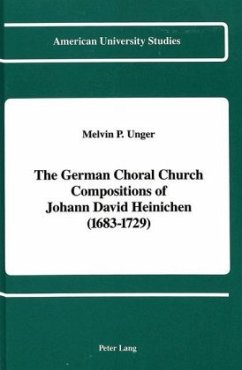This book examines the German church cantatas of Johann David Heinichen (1683-1729), a typically progressive contemporary of J.S. Bach. It explores the cantata's significance and development in Germany during the eighteenth century by clarifying its aesthetic basis, illuminating its range of musical styles, and placing these in the context of contemporaneous culture and society. Since Heinichen is best remembered today for his treatise on the thoroughbass, a book that includes a detailed explanation of musical rhetoric, special attention is given to Heinichen's own text structures and treatment. Because this book represents the first scholarly study of Heinichen's German choral works, it also discusses the authenticity, accuracy, chronology, and revisions of the manuscript sources.
"A very thorough and balanced approach to Heinichen's choral church music from a historic and analytic perspective. Dr. Unger's study was also informed by his edition of these works for performance purposes. Highly recommended for libraries, especially on the graduate level." (J.T. Kloppers, King's College)
"Unger has written the most thorough and up-to-date account of the choral church compositions of Johann David Heinichen, one of J.S. Bach's most important German contemporaries. Heinichen's style belongs to the progressive mainstream, which fully absorbed the more fashionable elements of Italian opera and French dance music. Knowledge of this strain of German church composition is crucial for an understanding of Bach's historical position and of the history of the German cantata and motet of the eighteenth century." (John Walter Hill, University of Illinois, Urbana-Champaign)
"Unger's discussion of the music itself is highly detailed, and contains a number of interestingobservations." (Geoffrey Weber, Music and Letters)
"A fine book for every musician interested not only in Heinichen but in the music life of his epoch." (Jutta Tagger, International Choral Bulletin)
"Unger has written the most thorough and up-to-date account of the choral church compositions of Johann David Heinichen, one of J.S. Bach's most important German contemporaries. Heinichen's style belongs to the progressive mainstream, which fully absorbed the more fashionable elements of Italian opera and French dance music. Knowledge of this strain of German church composition is crucial for an understanding of Bach's historical position and of the history of the German cantata and motet of the eighteenth century." (John Walter Hill, University of Illinois, Urbana-Champaign)
"Unger's discussion of the music itself is highly detailed, and contains a number of interestingobservations." (Geoffrey Weber, Music and Letters)
"A fine book for every musician interested not only in Heinichen but in the music life of his epoch." (Jutta Tagger, International Choral Bulletin)

